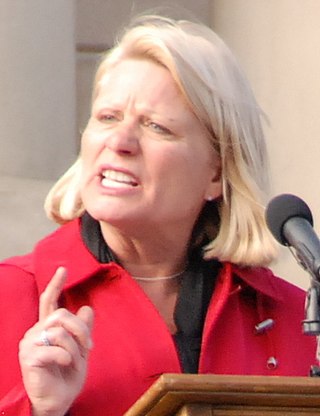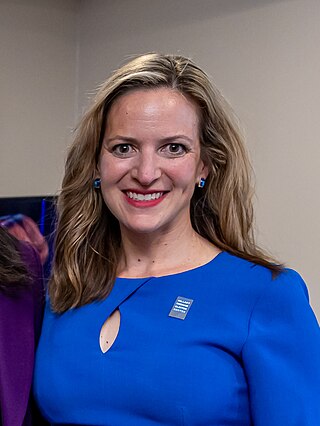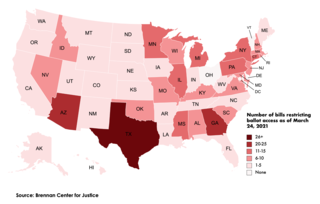Related Research Articles

Ruth Johnson is an American businesswoman and politician currently serving as a member of the Michigan Senate since 2019. She was the 42nd Secretary of State of Michigan from 2011 to 2019 and a member of the Michigan House of Representatives from 1999 to 2005. She is a Republican.

Kari Lake Halperin is an American former television news anchor. A member of the Republican Party, she is a candidate in the 2024 United States Senate election in Arizona. She was also the Republican nominee in the 2022 Arizona gubernatorial election.

Leon Drolet is a Michigan Republican politician and Anti-tax activist elected Macomb County Commissioner. He is a political activist known for his conservative fiscal views, which have caused criticism from politicians from both sides, including Candace Miller, L. Brooks Patterson and Mark Hackel. From 2001 to 2006, Drolet served in the Michigan House of Representatives. Drolet also served as a Macomb County, Michigan county commissioner from 1999 to 2000 and from 2006 to 2008. Drolet was active in the Southeast Michigan Tea Party Movement.

Elections in Oregon are all held using a Vote by Mail (VBM) system. This means that all registered voters receive their ballots via postal delivery and can vote from their homes. A state Voters’ Pamphlet is mailed to every household in Oregon about three weeks before each statewide election. It includes information about each measure and candidate in the upcoming election.

Jocelyn Benson is an American academic administrator, attorney, and politician serving as the 43rd Secretary of State of Michigan since 2019. A member of the Democratic Party, she is a former dean of Wayne State University Law School, a co-founder of the Military Spouses of Michigan, and a board member of the Ross Initiative in Sports for Equality. Benson is the author of State Secretaries of State: Guardians of the Democratic Process.

Karen Fann is a former Republican member of the Arizona Senate, representing Arizona Legislative District 1. Fann became President of the Arizona Senate in 2019, and served until 2023.

The 2018 United States elections were held on Tuesday, November 6, 2018. These midterm elections occurred during Incumbent Republican President Donald Trump's term. Although the Republican Party increased its majority in the Senate, unified Republican control of Congress and the White House was brought to an end when the Democratic Party won control of the House of Representatives in what was widely characterized as a "blue wave" election as Democrats also gained governorships, other statewide offices, and state legislative chambers.

Venden "Vince" Leach is an American politician from Arizona. A Republican, he was a member of the Arizona State Senate from 2019 to 2023, representing District 11. From 2015 to 2019, he was a member of the Arizona House of Representatives representing District 11.

NextGen America is a progressive advocacy nonprofit and political action committee created in 2013 by billionaire hedge fund manager Tom Steyer. The group mobilizes young voters on issues including climate, health care, reproductive freedom, immigration, and equality. Since its founding, the 501(c)(4) organization has registered 1.3 million voters, and contacted millions of young people with messages encouraging them to vote.

James Carl Marchant Jr. is an American politician in Nevada. A member of the Republican Party, he represented the 37th district in the Nevada Assembly, covering parts of the northwestern Las Vegas Valley, from 2016 to 2018. A staunch supporter of former President Donald Trump, Marchant was the Republican nominee for Nevada's 4th congressional district in 2020 and for Secretary of State of Nevada in 2022.

Karla Jurvetson is an American physician, philanthropist, and major Democratic donor. She has particularly focused on supporting candidates who are women, people of color, and from underrepresented communities, and she is a prominent activist in the movement to protect voting rights and American democracy. Jurvetson is vice chair of EMILY's List, which supports Democratic pro-choice women and has more than five million members.

Frank Carroll is an American politician and a Republican member of the Arizona Senate representing District 28 since January 9, 2023. He was a member of the Arizona House of Representatives from 2019 to 2023, representing House District 22. Carroll was first elected in 2018 to succeed State Representative David Livingston, who instead ran for State Senate.

The 2022 Arizona gubernatorial election occurred on November 8, 2022, to elect the next governor of Arizona, concurrently with other federal and state elections. Incumbent Republican governor Doug Ducey was term-limited and ineligible to run for a third consecutive term. Democratic Arizona Secretary of State Katie Hobbs narrowly defeated Republican former television journalist Kari Lake.
Before Election Day of the 2020 United States presidential election, lawsuits related to the voting process were filed in various states. Many of these lawsuits were related to measures taken by state legislatures and election officials in response to the COVID-19 pandemic.
The following is a timeline of major events before, during, and after the 2020 United States presidential election, the 59th quadrennial United States presidential election, from November 2020 to January 2021. For prior events, see Timeline of the 2020 United States presidential election (2017–2019) and Timeline of the 2020 United States presidential election.

The 2022 Arizona elections were held in the state of Arizona on November 8, 2022, coinciding with the nationwide general election. All six executive offices were up for election, as well as a U.S. Senate seat, all of the state's U.S. House of Representatives seats, and the state legislature.

Following the 2020 United States presidential election and the unsuccessful attempts by Donald Trump and various other Republican officials to overturn it, Republican lawmakers initiated a sweeping effort to make voting laws more restrictive within several states across the country. According to the Brennan Center for Justice, as of October 4, 2021, more than 425 bills that would restrict voting access have been introduced in 49 states—with 33 of these bills enacted across 19 states so far. The bills are largely centered around limiting mail-in voting, strengthening voter ID laws, shortening early voting, eliminating automatic and same-day voter registration, curbing the use of ballot drop boxes, and allowing for increased purging of voter rolls. Republicans in at least eight states have also introduced bills that would give lawmakers greater power over election administration after they were unsuccessful in their attempts to overturn election results in swing states won by Democratic candidate Joe Biden in the 2020 election. The efforts garnered press attention and public outrage from Democrats, and by 2023 Republicans had adopted a more "under the radar" approach to achieve their goals.

The 2022 Arizona Secretary of State election was held on Tuesday, November 8, to elect the next Secretary of State of Arizona. Incumbent Secretary of State Katie Hobbs declined to run for a second term, to instead run for governor. Primary elections were held on August 2, 2022. Democrat and former Maricopa County recorder Adrian Fontes defeated Republican representative Mark Finchem by 4.8%.

The America First Secretary of State Coalition was an American right-wing coalition formed to support a slate of candidates in the 2022 United States secretary of state elections who supported former president Donald Trump's baseless claims that the 2020 election was stolen. The coalition's president was Jim Marchant, the unsuccessful Republican nominee for Secretary of State of Nevada, and was headquartered in Las Vegas.

Liz Harris is an American politician from Arizona and the Arizona RNC National Committeewoman. A Republican, she was a member of the Arizona House of Representatives from January 2023 to April 2023. Harris was elected in November 2022 from the 13th legislative district, which includes much of Chandler, Arizona.
References
- 1 2 Shear, Michael D. (2015-11-09). "Democratic Group Called iVote Pushes Automatic Voter Registration". The New York Times. ISSN 0362-4331 . Retrieved 2022-06-16.
- ↑ "⚡ Extreme defeat". Axios. Retrieved 2022-12-02.
- ↑ "The exciting war to make secretaries of state more boring". Washington Post. ISSN 0190-8286 . Retrieved 2022-06-16.
- ↑ "Voter-Suppression Tricks Are on the Ballot, Too". Bloomberg.com. 2018-10-24. Retrieved 2022-06-16.
- ↑ Panetta, Grace. "The Trump-inspired battles over new voting laws will shape the 2022 governors' races". Business Insider. Retrieved 2022-06-16.
- 1 2 3 4 "Nevada Question 5, Automatic Voter Registration via DMV Initiative (2018)".
- 1 2 "ELLEN KURZ (she/her) - NYU Alumni Changemaker of the Year (GAL '80". New York University). Archived from the original on 2022-04-01.
- 1 2 "National Voting Rights Group Spent Nearly $1 Million on Michigan's 2018 Race for Secretary of State". 11 March 2019.
- 1 2 Gardiner, Dustin. "Behind Katie Hobbs' win: How Democrats flipped Arizona's 2nd-highest office". The Arizona Republic. Retrieved 2022-06-16.
- ↑ "Tale of two campaigns for Secretary of State: Dem is backed by advocacy group, GOP incumbent lets record speak". 22 October 2018.
- ↑ "⚡ Extreme defeat". Axios. Retrieved 2022-12-02.
- ↑ "⚡ Extreme defeat". Axios. Retrieved 2022-12-02.
- ↑ "iVote to spend $5 million in Arizona Secretary of State race". NBC News. Retrieved 2022-12-02.